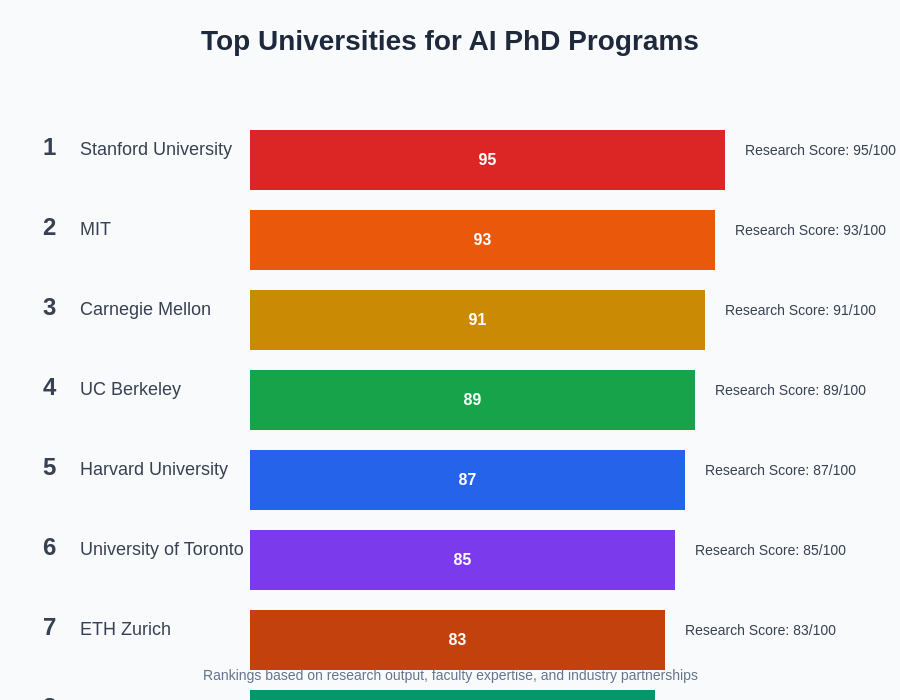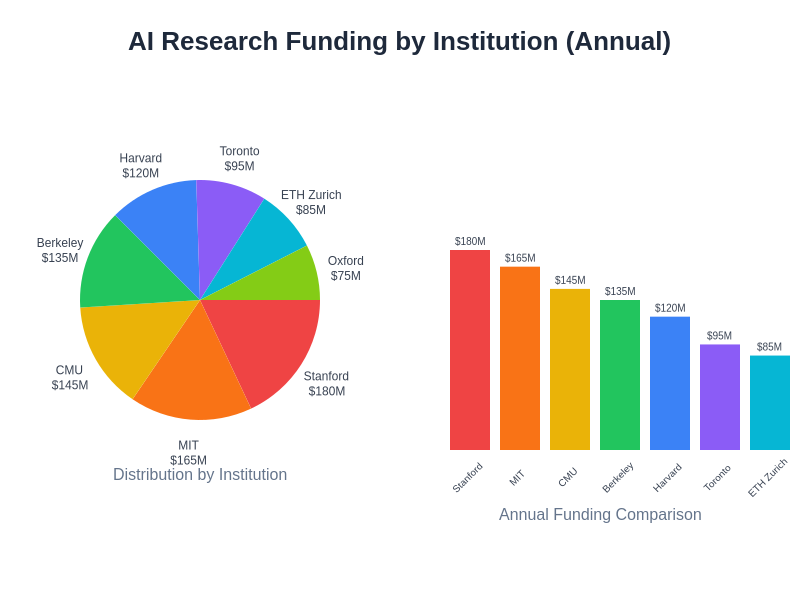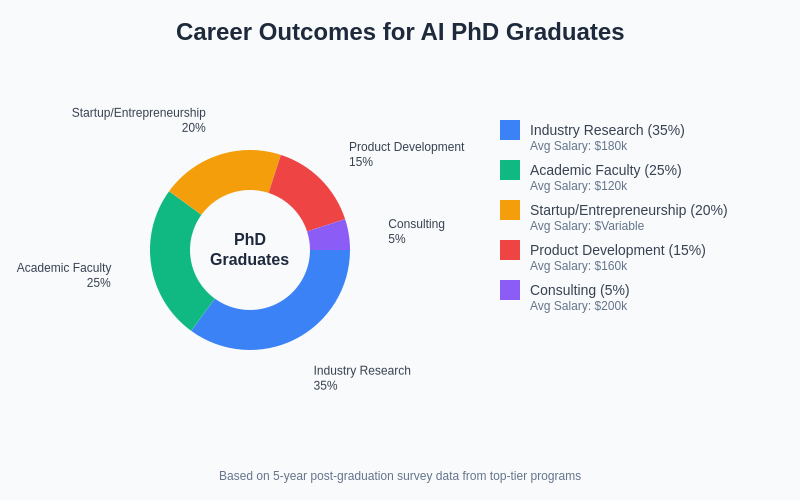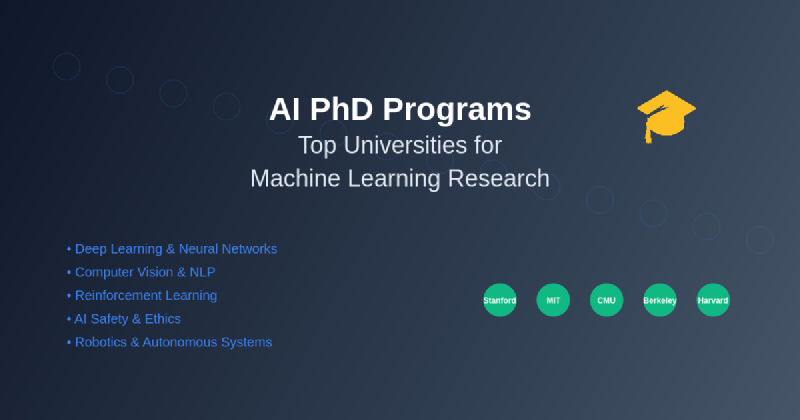The pursuit of a doctoral degree in artificial intelligence and machine learning represents one of the most intellectually demanding yet rewarding academic endeavors in contemporary higher education. As artificial intelligence continues to reshape industries and redefine technological possibilities, the demand for highly skilled researchers and practitioners with advanced expertise in machine learning, deep learning, and related disciplines has reached unprecedented levels. The selection of an appropriate PhD program in AI becomes a pivotal decision that can fundamentally influence the trajectory of one’s research career and professional development.
Explore the latest developments in AI education to understand emerging trends and opportunities in artificial intelligence graduate programs. The landscape of AI doctoral education has evolved dramatically over the past decade, with universities worldwide establishing specialized programs, interdisciplinary research centers, and innovative curricula designed to address the growing complexity and scope of artificial intelligence research.
The Evolution of AI Doctoral Education
The transformation of artificial intelligence from a niche academic discipline to a mainstream field of study has fundamentally altered the structure and content of doctoral programs worldwide. Traditional computer science departments have expanded their offerings to include specialized tracks in machine learning, natural language processing, computer vision, and robotics, while many institutions have established dedicated AI research institutes and interdisciplinary programs that draw faculty and resources from multiple departments including mathematics, statistics, cognitive science, and engineering.
This evolution reflects the inherently interdisciplinary nature of contemporary AI research, which increasingly requires expertise spanning multiple domains. Modern AI PhD programs emphasize not only technical proficiency in algorithms and computational methods but also deep understanding of the theoretical foundations underlying machine learning, the ethical implications of AI systems, and the practical challenges of deploying intelligent technologies in real-world applications. The most successful programs have adapted their curricula to balance rigorous mathematical training with hands-on experience in cutting-edge research methodologies and emerging technologies.
Stanford University: Pioneer in AI Research Excellence
Stanford University has long been recognized as a global leader in artificial intelligence research and education, with its Computer Science Department consistently ranking among the top programs worldwide. The university’s AI PhD program benefits from an exceptional concentration of renowned faculty members who have made foundational contributions to machine learning theory, computer vision, natural language processing, and robotics. The Stanford Artificial Intelligence Laboratory, one of the oldest AI research institutions in the world, provides PhD students with access to state-of-the-art computational resources and opportunities to collaborate on groundbreaking research projects.
The interdisciplinary approach at Stanford encourages PhD students to explore connections between AI and other fields, with many students pursuing joint research projects with faculty from the School of Medicine, Graduate School of Business, and Department of Psychology. This cross-pollination of ideas has led to innovative applications of AI in healthcare, finance, autonomous systems, and human-computer interaction. Stanford’s strong industry connections, particularly in Silicon Valley, provide students with unique opportunities for internships, collaborative research projects with leading technology companies, and post-graduation career prospects in both academia and industry.
Discover advanced AI research methodologies with Claude to enhance your understanding of cutting-edge machine learning techniques and research approaches. The collaborative environment at Stanford fosters innovation through regular seminars, workshops, and conferences that bring together students, faculty, and industry experts to discuss the latest developments in artificial intelligence research.
Massachusetts Institute of Technology: Engineering Excellence in AI
The Massachusetts Institute of Technology has established itself as a premier destination for AI doctoral studies through its Computer Science and Artificial Intelligence Laboratory, which represents one of the largest and most productive AI research organizations globally. MIT’s PhD program in AI emphasizes both theoretical rigor and practical application, with students gaining expertise in fundamental algorithms, mathematical optimization, statistical learning theory, and computational complexity while working on real-world problems that have significant societal impact.
The institute’s commitment to interdisciplinary research is evident in its numerous collaborative initiatives, including the MIT-IBM Watson AI Lab, the Toyota-MIT Research Institute, and various partnerships with healthcare institutions and government agencies. PhD students at MIT benefit from access to world-class faculty members who are leaders in their respective fields, as well as extensive computational resources and laboratory facilities that support cutting-edge research in areas such as autonomous systems, machine learning theory, computer vision, and artificial general intelligence.
Carnegie Mellon University: Robotics and Machine Learning Leadership
Carnegie Mellon University has earned international recognition for its exceptional programs in robotics, machine learning, and artificial intelligence, with its School of Computer Science offering one of the most comprehensive and well-regarded AI PhD programs in the world. The university’s Machine Learning Department, one of the first dedicated departments of its kind, provides students with intensive training in statistical learning theory, optimization methods, and advanced algorithmic techniques while encouraging exploration of novel research directions and interdisciplinary collaborations.
The Robotics Institute at Carnegie Mellon represents a unique asset for AI PhD students, offering opportunities to work on projects that integrate machine learning with autonomous systems, computer vision, and human-robot interaction. The institute’s emphasis on real-world applications has led to significant contributions in areas such as autonomous vehicles, medical robotics, space exploration, and industrial automation. Students benefit from close mentorship by faculty members who are recognized leaders in their fields, as well as access to specialized facilities including robot testing environments, sensor laboratories, and high-performance computing clusters.
University of California, Berkeley: Innovation in Deep Learning
The University of California, Berkeley has emerged as a major center for artificial intelligence research, particularly in the areas of deep learning, reinforcement learning, and computer vision. The Berkeley Artificial Intelligence Research Laboratory serves as the hub for doctoral research activities, providing students with opportunities to work on cutting-edge projects in machine learning theory, algorithmic development, and AI safety research. The program’s strength lies in its combination of theoretical rigor and practical innovation, with faculty and students contributing to both fundamental advances in AI theory and breakthrough applications in industry and society.
Berkeley’s location in the San Francisco Bay Area provides PhD students with exceptional opportunities for collaboration with leading technology companies, startup organizations, and research institutions. The university’s commitment to open research and public benefit has led to the development of influential open-source tools and datasets that have advanced the broader AI research community. Students in Berkeley’s AI PhD program benefit from a collaborative environment that encourages interdisciplinary research and the exploration of AI applications in fields such as healthcare, environmental science, and social policy.

The competitive landscape of AI doctoral education reflects the growing importance of artificial intelligence research in academic and industrial contexts. These leading institutions distinguish themselves through exceptional faculty expertise, comprehensive research facilities, and strong industry partnerships that provide students with unparalleled opportunities for professional development.

The competitive landscape of AI doctoral education reflects the growing importance of artificial intelligence research in academic and industrial contexts. These leading institutions distinguish themselves through exceptional faculty expertise, comprehensive research facilities, and strong industry partnerships that provide students with unparalleled opportunities for professional development.
Harvard University: Interdisciplinary AI Research
Harvard University’s approach to AI doctoral education emphasizes interdisciplinary collaboration and the application of artificial intelligence techniques to address complex challenges in medicine, biology, social sciences, and public policy. The university’s School of Engineering and Applied Sciences offers PhD programs that integrate computer science with domain-specific knowledge, enabling students to develop AI solutions for real-world problems while advancing theoretical understanding of machine learning and artificial intelligence.
The John A. Paulson School of Engineering and Applied Sciences provides AI PhD students with access to world-class faculty members who are leaders in machine learning theory, computational biology, natural language processing, and AI ethics. Harvard’s strong connections with affiliated hospitals and research institutions create unique opportunities for students interested in applying AI techniques to medical diagnosis, drug discovery, epidemiological modeling, and precision medicine. The interdisciplinary nature of research at Harvard encourages students to explore novel applications of AI while maintaining rigorous standards for theoretical contributions.
Enhance your research capabilities with Perplexity for comprehensive literature reviews and advanced information synthesis essential for doctoral research in artificial intelligence. The collaborative research environment at Harvard facilitates cross-disciplinary partnerships that often lead to innovative approaches to longstanding challenges in science and society.
University of Toronto: Deep Learning Innovation Hub
The University of Toronto has played a pivotal role in the deep learning revolution, with faculty members such as Geoffrey Hinton contributing fundamental advances that have shaped modern artificial intelligence. The university’s PhD program in computer science offers specialized tracks in machine learning and artificial intelligence, providing students with intensive training in neural networks, deep learning architectures, and advanced optimization techniques. The Vector Institute, affiliated with the University of Toronto, serves as a major research hub for AI and machine learning, offering additional resources and collaborative opportunities for doctoral students.
Toronto’s vibrant AI ecosystem includes strong industry partnerships with major technology companies, numerous AI startups, and government research initiatives that provide PhD students with diverse opportunities for internships, collaborative research projects, and career development. The university’s commitment to responsible AI development is reflected in its research programs focusing on AI safety, fairness, and interpretability, areas of increasing importance as AI systems become more prevalent in society.
ETH Zurich: European Excellence in AI Research
ETH Zurich represents one of Europe’s premier institutions for AI and machine learning research, offering PhD programs that combine theoretical rigor with practical innovation. The university’s Department of Computer Science provides students with access to world-class faculty members who are leaders in machine learning theory, computer vision, robotics, and AI safety research. ETH’s strong emphasis on mathematical foundations ensures that students develop deep understanding of the theoretical principles underlying modern AI systems.
The institution’s location in Switzerland provides unique advantages including access to a multilingual research environment, strong industry partnerships with European technology companies, and collaboration opportunities with other leading European research institutions. ETH Zurich’s commitment to interdisciplinary research is evident in its numerous collaborative programs that integrate AI with fields such as materials science, climate modeling, and biomedical engineering.

Research funding represents a critical factor in determining the quality and scope of AI doctoral programs, with leading institutions securing substantial support from government agencies, private foundations, and industry partnerships that enable cutting-edge research and student support.
Oxford University: AI Research Tradition and Innovation
The University of Oxford has established itself as a leading center for AI research through its Department of Computer Science and the Oxford Internet Institute, which together provide comprehensive doctoral programs in artificial intelligence and machine learning. Oxford’s approach to AI education emphasizes both theoretical understanding and practical application, with students working on projects that range from fundamental algorithmic development to real-world implementations in healthcare, finance, and public policy.
The university’s DeepMind partnership has created unique research opportunities in areas such as artificial general intelligence, reinforcement learning, and AI safety, providing students with access to cutting-edge research projects and world-class mentorship. Oxford’s traditional tutorial system, adapted for doctoral education, ensures that students receive personalized guidance and develop deep expertise in their chosen research areas.

Research funding represents a critical factor in determining the quality and scope of AI doctoral programs, with leading institutions securing substantial support from government agencies, private foundations, and industry partnerships that enable cutting-edge research and student support.
Emerging Programs and Future Trends
The rapid evolution of artificial intelligence has led to the establishment of new PhD programs at universities worldwide, each bringing unique perspectives and strengths to AI education. Institutions such as the University of Washington, Georgia Institute of Technology, and New York University have developed exceptional programs that focus on specific aspects of AI research including natural language processing, computer graphics, and AI ethics respectively.
International programs at universities in Canada, the United Kingdom, Germany, and Asia offer alternative approaches to AI education, often emphasizing different theoretical frameworks or application domains. These emerging programs frequently adopt innovative pedagogical approaches, including industry collaborations, international exchange programs, and interdisciplinary research initiatives that prepare students for the evolving landscape of AI research and development.
Selection Criteria for AI PhD Programs
The selection of an appropriate AI PhD program requires careful consideration of multiple factors including faculty expertise, research facilities, funding opportunities, and career placement records. Prospective students should evaluate the alignment between their research interests and the strengths of different programs, considering factors such as the availability of specialized courses, access to computational resources, and opportunities for collaboration with industry partners.
The quality of mentorship available in different programs represents a crucial consideration, as the relationship between doctoral students and their advisors significantly influences both the research experience and career outcomes. Students should also consider the broader research environment, including the presence of postdoctoral researchers, visiting scholars, and collaborative relationships with other institutions that can enhance the doctoral experience.

Career trajectories for AI PhD graduates reflect the diverse opportunities available in academia, industry research, entrepreneurship, and public sector applications, with graduates from top programs achieving success across multiple professional pathways.
Application Strategies and Preparation
Success in gaining admission to competitive AI PhD programs requires strategic preparation that begins years before the application deadline. Prospective students should focus on developing strong mathematical foundations, gaining research experience through undergraduate or master’s programs, and demonstrating proficiency in programming languages and tools commonly used in AI research. Publications in peer-reviewed venues, contributions to open-source projects, and presentations at academic conferences can significantly strengthen applications.
The application process itself requires careful attention to multiple components including personal statements that articulate research interests and career goals, letters of recommendation from faculty members who can speak to research potential, and standardized test scores that meet program requirements. Many successful applicants benefit from direct communication with potential advisors, attendance at academic conferences, and participation in research programs that provide exposure to cutting-edge AI research.
Funding and Financial Considerations
The financial aspects of pursuing an AI PhD represent important considerations that can significantly impact the doctoral experience. Most competitive programs offer full funding packages that include tuition coverage, stipends for living expenses, and support for research activities and conference travel. Students should carefully evaluate the terms and duration of funding offers, considering factors such as teaching requirements, research assistantship opportunities, and additional funding sources for specialized equipment or international collaborations.
External funding opportunities through national science foundations, private foundations, and industry partnerships can provide additional support and recognition for exceptional students. Many AI PhD programs also offer opportunities for summer internships with technology companies, which can provide valuable industry experience while supplementing financial support during the doctoral program.
Industry Connections and Career Prospects
The strong connections between leading AI PhD programs and industry represent significant advantages for students seeking diverse career opportunities. Major technology companies actively recruit PhD graduates from top programs, offering positions in research laboratories, product development teams, and strategic planning organizations. The skills developed during AI doctoral studies, including advanced analytical thinking, research methodology, and technical expertise, are highly valued across multiple industries including healthcare, finance, automotive, and entertainment.
Entrepreneurial opportunities represent another attractive career path for AI PhD graduates, with many successful startups founded by individuals with advanced degrees in artificial intelligence and machine learning. The combination of technical expertise, research experience, and industry connections gained during doctoral studies provides an excellent foundation for identifying market opportunities and developing innovative AI-based solutions.

Career trajectories for AI PhD graduates reflect the diverse opportunities available in academia, industry research, entrepreneurship, and public sector applications, with graduates from top programs achieving success across multiple professional pathways.
Research Areas and Specialization Opportunities
Contemporary AI PhD programs offer specialization opportunities across numerous research areas reflecting the breadth and depth of modern artificial intelligence. Machine learning theory continues to represent a core area of study, with students exploring topics such as statistical learning theory, optimization algorithms, and generalization bounds. Deep learning research encompasses areas including neural architecture design, training methodologies, and applications to computer vision, natural language processing, and speech recognition.
Emerging research areas such as AI safety, interpretable machine learning, and federated learning represent exciting opportunities for students interested in addressing current challenges in AI deployment and governance. Interdisciplinary research areas including computational biology, digital humanities, and AI for social good provide opportunities to apply artificial intelligence techniques to address important societal challenges while advancing the theoretical foundations of the field.
Future Perspectives and Conclusion
The landscape of AI doctoral education continues to evolve rapidly, reflecting the dynamic nature of artificial intelligence research and the growing importance of AI across multiple sectors of society. Future developments in AI PhD programs are likely to include increased emphasis on interdisciplinary collaboration, stronger integration with industry research initiatives, and expanded focus on the ethical and societal implications of artificial intelligence systems.
Prospective students entering AI PhD programs today will emerge as researchers and leaders during a period of unprecedented opportunity and responsibility in artificial intelligence. The advanced training, research experience, and professional networks developed during doctoral studies will position graduates to contribute to fundamental advances in AI theory while addressing practical challenges in deploying intelligent systems for societal benefit. The investment in AI doctoral education represents not only a commitment to individual professional development but also a contribution to the continued advancement of artificial intelligence as a field that has the potential to transform our understanding of intelligence, computation, and human-machine collaboration.
The selection of an AI PhD program represents a significant decision that will influence both immediate research opportunities and long-term career trajectories. By carefully evaluating the strengths and characteristics of different programs, prospective students can identify opportunities that align with their research interests, professional goals, and personal circumstances, setting the foundation for successful and impactful careers in artificial intelligence research and development.
Disclaimer
This article provides general information about AI PhD programs and should not be considered as specific academic or career advice. Program requirements, faculty, and research opportunities may change over time. Prospective students should conduct thorough research and consult with academic advisors when making decisions about doctoral studies. Rankings and evaluations presented are based on publicly available information and may not reflect all relevant factors for individual decision-making. The effectiveness of different programs may vary depending on specific research interests, career goals, and personal circumstances.
